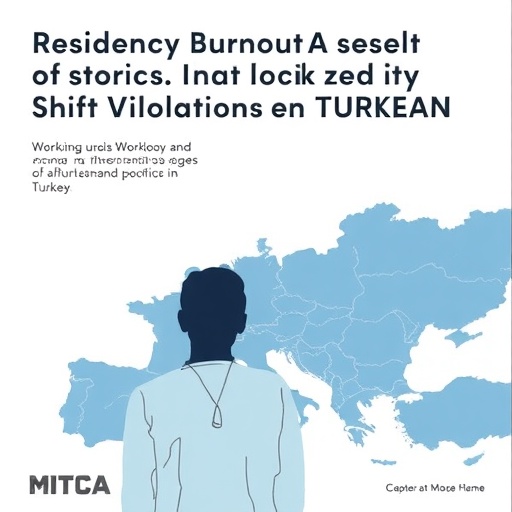In a stark examination of the residency training landscape in Turkey, recent research has illuminated the pernicious effects of workload and shift violations on medical residents. This study, authored by M.K. Karaman and Ö. Deniz, emphasizes the exploitation faced by these young professionals, revealing not only the physical burden but also the psychological strain imposed by an unforgiving medical training environment. With increasing awareness surrounding mental health, the findings from this critical piece of research underscore the need for systemic changes across Turkish medical institutions.
Residency training has served as a rite of passage for many aspiring physicians, but the process is marred by excessive demands and insufficient support. The study highlights that medical residents frequently encounter workloads that exceed the recommended limits set forth by health authorities. This excessive burden can lead to a range of negative health outcomes, including fatigue, burnout, and anxiety. The research indicates a concerning trend in Turkish medical schools and hospitals where residents are pushed beyond their limits, often at the expense of their well-being.
Moreover, the exploration of shift violations is equally alarming. Karaman and Deniz depict a troubling picture where medical residents work extended hours without adequate rest periods. These violations not only contravene established guidelines but also jeopardize patient safety. An overworked and sleep-deprived resident is less likely to make sound medical judgments, which can have far-reaching implications in patient care. The study serves as a clarion call for reform, urging medical institutions to prioritize both resident welfare and patient safety.
What makes this research particularly compelling is its focus on the psychological dimensions of residency training. The mental toll of navigating such a demanding work environment is often overlooked in favor of discussing physical health. However, the authors evidence that anxiety and depression are prevalent among residents, exacerbated by an unrelenting work schedule. Residents often feel isolated, grappling with the struggle to meet both educational and professional demands while maintaining their mental health.
Additionally, the study draws attention to the societal expectations placed on medical professionals. In a country where healthcare is revered, residents may feel pressured to conform to a culture that glorifies overwork. This entrenched mentality can lead to a cycle of exploitation, where the sacrifices made by residents are normalized and expected. Karaman and Deniz challenge this narrative, advocating for a shift in perception that recognizes the humanity of medical professionals.
Given the study’s findings, it is imperative for stakeholders in the medical community to take action. Medical schools must reevaluate their residency programs, placing emphasis on sustainable work hours and mental health support. Implementing mentorship programs and peer support systems could be transformative, providing residents with a much-needed outlet for their experiences and challenges. Additionally, incorporating wellness initiatives such as mindfulness and stress management training into the curriculum could foster a healthier environment.
The exploration of this topic could not come at a more crucial time. As healthcare systems globally grapple with the complexities of physician burnout and mental health challenges, the research from Karaman and Deniz offers a timely assessment of how these issues manifest within the Turkish context. A comprehensive response is needed, one that acknowledges the findings of this study and commits to meaningful change.
As the medical community reflects on the implications of this research, it becomes clear that a paradigm shift is necessary. The well-being of residents should not be a secondary consideration; it must be integral to the training process. By advocating for balance, institutions can cultivate a generation of doctors who are not only skilled but also mentally healthy and prepared to provide high-quality care.
This research contributes to a growing body of literature calling for improved conditions within medical training programs. It is a testament to the dedication of researchers who not only seek to understand the challenges faced by residents but also aim to advocate for change. By bringing these issues to light, Karaman and Deniz play a critical role in shaping the future of residency training in Turkey and potentially influencing similar discussions worldwide.
As the effects of these systemic issues ripple through the medical community, the urgency for change has never been greater. The findings of this research must serve as a catalyst for dialogue among educators, health organizations, and policymakers. It is only by addressing these foundational challenges that we can hope to create a more equitable and supportive environment for future generations of medical professionals.
In conclusion, the troubling exploitation and psychological strain documented in Turkish residency training highlight a broader systemic issue that extends beyond any single institution or individual. This study serves as a pivotal moment in the ongoing conversation about the well-being of medical professionals. As we move forward, let us prioritize the health of residents, ensuring that our future healthcare providers can thrive both personally and professionally in a demanding yet rewarding field.
Subject of Research: Exploitation and psychological strain in residency training in Turkish medical schools and research hospitals.
Article Title: Exploitation and psychological strain in residency training: workload and shift violations in Turkish medical schools and research hospitals.
Article References:
Karaman, M.K., Deniz, Ö. Exploitation and psychological strain in residency training: workload and shift violations in Turkish medical schools and research hospitals.
BMC Med Educ 25, 1621 (2025). https://doi.org/10.1186/s12909-025-08173-9
Image Credits: AI Generated
DOI: https://doi.org/10.1186/s12909-025-08173-9
Keywords: Residency training, medical education, psychological strain, workload, shift violations, Turkish medical institutions, mental health, physician burnout, medical professionals.




